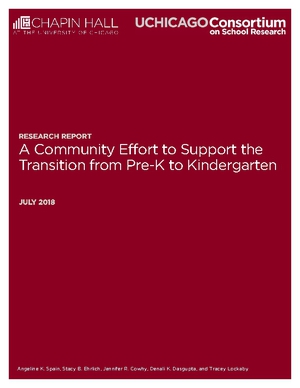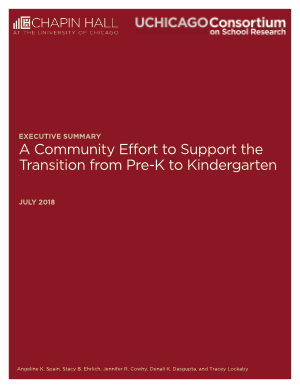1. Was the Pre-Kindergarten to Kindergarten Transition Project (PKTP) implemented as designed?
2. In what ways did PKTP participation influence; a) relationships among teachers and family members and b) communication about the importance of transition?
The Pre-Kindergarten to Kindergarten Transition Project (PKTP) is a teacher co-designed, community-wide approach to strengthening early educational transitions in Chicago’s Altgeld-Riverdale neighborhood. The program engages preschool and kindergarten teachers at all community-based centers and elementary schools in the neighborhood. A Community Effort to Support the Transition from Pre-K to Kindergarten is a study of PKTP’s first full year of implementation. In this study researchers found that that participating teachers and family members reported a greater sense of community as a result of their participation.
PKTP has three components: a facilitated cross-grade, cross-school professional learning community for teachers; common classroom practices across pre-K and kindergarten; and family learning activities. This program is staffed by Business and Professional People for the Public Interest (BPI), a public interest law and policy center. Chapin Hall and the UChicago Consortium conducted a mixed-methods study to investigate PKTP’s implementation and the influence of PKTP participation on relationships among teachers and family members. The impact of communication about the importance of transition was also examined.
Researchers administered teacher and parent surveys at the beginning and end of the 2016-17 school year. They also conducted teacher interviews, focus groups with families of preschool (pre-K) and kindergarten-aged children, observed PKTP activities, and analyzed implementation documents.
Key Findings
- Teachers reported that the PKTP’s community-wide focus was unique and central to their engagement with each other and the collaborative relationships fundamental to creating alignment between pre-K and kindergarten.
- PKTP’s three components were mutually reinforcing over time and facilitated both classroom and community transition work.
- Teachers and parents reported a greater sense of community as a result of their PKTP participation. Teachers reported feeling more connected to each other across grade levels and schools because of their participation in PKTP. Teachers and parents also reported feeling more connected with each other through the family learning activities.
- Despite teachers’ buy-in to common classroom practices, implementation varied between grades and sites.
Community building opportunities support the strengthening of relationships between children, family, teachers, and community—all of which contribute to students’ transition experiences.
The PKTP program's components are designed to be adapted by teachers and program staff. This collaborative approach can both facilitate and obstruct implementation. It can strengthen how the program addresses student needs and incorporates community context over time. But this approach can also contribute to different ideas about what is supposed to be implemented, when, and by whom.
Facilitation and coordination play a crucial role in supporting implementation and teachers’ collaborative relationships. The time necessary to plan professional learning community meetings, field trips, and family learning activities is substantial. Having an external facilitator is one strategy for relieving teachers of these responsibilities.



